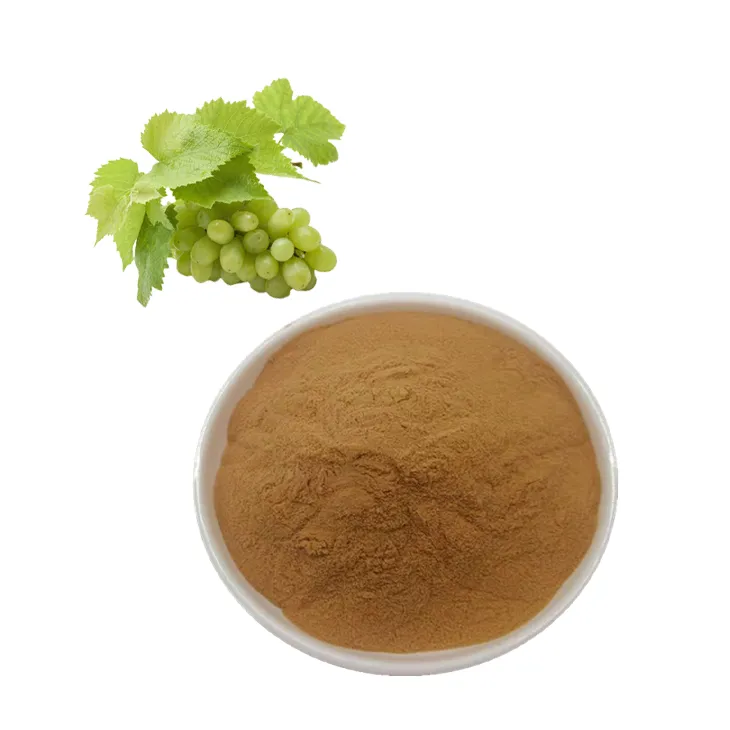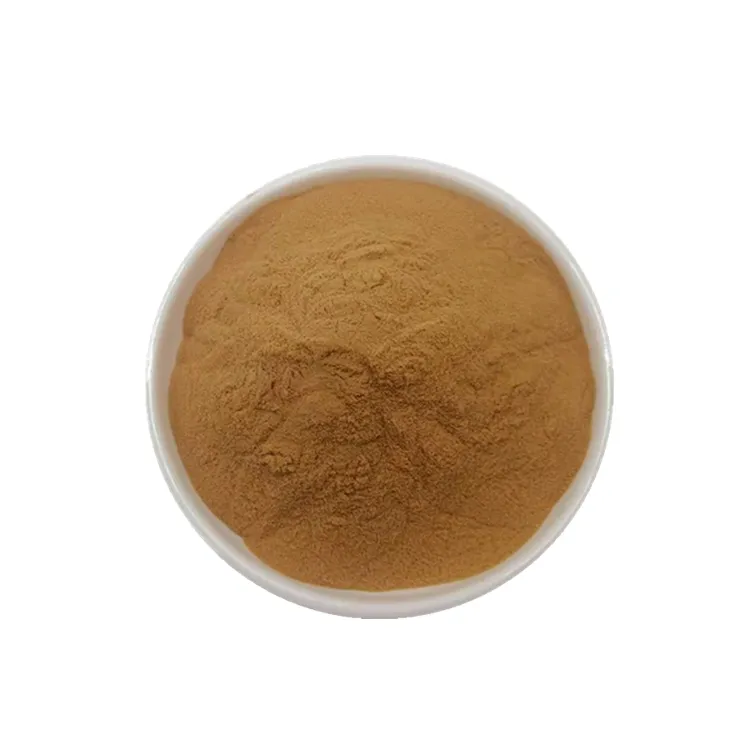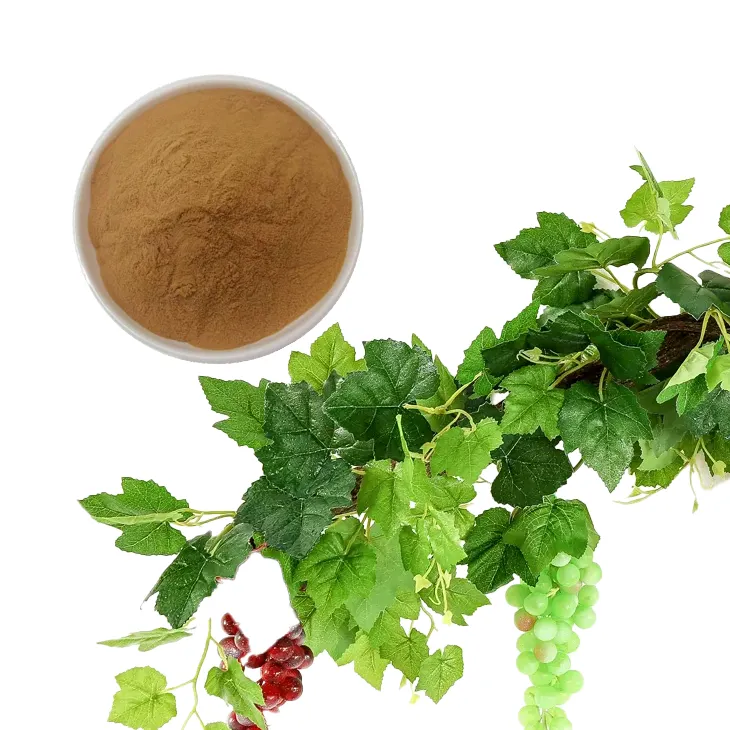- 0086-571-85302990
- sales@greenskybio.com
Natural Ingredient in Anti - aging Skin Care Products - Grape Leaf Extract.
2024-11-11

Introduction
In the world of skin care, the pursuit of anti - aging solutions has led to an increased focus on natural ingredients. Among these, Grape Leaf Extract has emerged as a promising component. The beauty industry is constantly on the lookout for ingredients that can effectively combat the signs of aging, and Grape Leaf Extract seems to hold great potential. This extract is derived from grape leaves, which are a part of the grapevine, a plant that has been cultivated for centuries for its fruit - grapes. However, it is now becoming evident that the leaves themselves possess valuable properties for skin health.

The Composition of Grape Leaf Extract
Grape leaves are rich in a variety of compounds that contribute to their beneficial effects on the skin. Polyphenols are one of the major groups of substances found in grape leaf extract. These polyphenols include flavonoids, which are known for their antioxidant properties. For example, Quercetin, a type of flavonoid, has been studied extensively for its ability to protect cells from oxidative damage. Another important component is resveratrol, which is also present in grape skins and seeds but is found in significant amounts in grape leaves as well. Resveratrol has been associated with numerous health benefits, including anti - aging effects.
There are also other bioactive compounds in grape leaf extract, such as tannins. Tannins have astringent properties, which can help tighten the skin and improve its texture. Additionally, grape leaf extract contains vitamins, such as vitamin C and vitamin E, which are essential for skin health. Vitamin C is involved in collagen synthesis, which is crucial for maintaining the firmness and elasticity of the skin, while vitamin E is a powerful antioxidant that helps protect the skin from free radical damage.

Antioxidant Activity
The antioxidant activity of grape leaf extract is one of its most significant features in the context of anti - aging skin care. Free radicals are highly reactive molecules that can cause oxidative stress on the skin. Oxidative stress is closely linked to the aging process, as it can damage cells, proteins, and DNA in the skin. Grape leaf extract can scavenge these free radicals, thereby reducing the oxidative stress on the skin.
When free radicals interact with the skin cells, they can initiate a chain reaction that leads to the breakdown of collagen and elastin fibers. Collagen is responsible for the firmness of the skin, while elastin provides elasticity. By neutralizing free radicals, grape leaf extract helps to preserve the integrity of these fibers, keeping the skin looking youthful and supple. Moreover, antioxidants in the grape leaf extract can also protect the skin from environmental factors such as UV radiation, pollution, and cigarette smoke, which are major sources of free radicals.

Enhancing Skin Barrier Function
Another important role of grape leaf extract in anti - aging skin care is its ability to enhance the skin's barrier function. The skin barrier is crucial for maintaining skin health as it prevents the loss of moisture from the skin and protects it from external invaders such as bacteria and allergens.
Studies have shown that grape leaf extract can stimulate the production of ceramides in the skin. Ceramides are lipid molecules that play a vital role in maintaining the integrity of the skin barrier. By increasing the levels of ceramides, grape leaf extract helps the skin to retain moisture more effectively. This results in a more hydrated skin, which appears plump and smooth. A well - hydrated skin also has a reduced appearance of fine lines and wrinkles, which are common signs of aging.
Regulation of Melanin Production
Melanin is the pigment responsible for the color of our skin, hair, and eyes. However, an overproduction of melanin can lead to the formation of age spots, also known as liver spots, which are a common sign of aging. Grape leaf extract may have a regulatory effect on melanin production.
Although the exact mechanism is still being studied, it is believed that the bioactive compounds in grape leaf extract can interact with the cells in the skin that produce melanin, known as melanocytes. By modulating the activity of these melanocytes, grape leaf extract may help to reduce the excessive production of melanin, thereby lightening age spots and evening out the skin tone. This can contribute to a more youthful and radiant complexion.
Clinical Studies and Evidence
There have been several clinical studies conducted to evaluate the effectiveness of grape leaf extract in anti - aging skin care. In one study, a group of participants applied a skin care product containing grape leaf extract for a period of several weeks. The results showed a significant improvement in skin hydration levels compared to the control group. Another study focused on the antioxidant effects of grape leaf extract on the skin. Skin samples were analyzed before and after the application of the extract, and it was found that the levels of oxidative stress markers were significantly reduced.
However, more research is still needed to fully understand the long - term effects of grape leaf extract on anti - aging. For example, studies on a larger sample size and over a longer period of time are required to confirm its effectiveness in reducing wrinkles and age spots. Additionally, research into the safety of using grape leaf extract in different skin types and conditions is also necessary.
Incorporating Grape Leaf Extract into Skin Care Products
As the potential of grape leaf extract in anti - aging skin care becomes more recognized, many skin care brands are starting to incorporate it into their products. Grape leaf extract can be found in a variety of formulations, including creams, lotions, serums, and masks.
When formulating products with grape leaf extract, it is important to consider the stability of the extract and its compatibility with other ingredients. For example, some ingredients may interact with the polyphenols in the grape leaf extract and reduce its effectiveness. Therefore, careful formulation is required to ensure that the maximum benefits of grape leaf extract are delivered to the skin.
Conclusion
In conclusion, grape leaf extract is a natural ingredient with great potential in anti - aging skin care. Its antioxidant activity, ability to enhance the skin barrier function, and potential to regulate melanin production make it a valuable addition to skin care products. While there is already some evidence supporting its effectiveness, further research is needed to fully explore its benefits and ensure its safety for long - term use. As consumers continue to demand natural and effective anti - aging solutions, grape leaf extract is likely to play an increasingly important role in the future of skin care.
FAQ:
1. What makes grape leaf extract suitable for anti - aging skin care products?
Grape leaf extract is suitable for anti - aging skin care products due to several reasons. Firstly, it has outstanding antioxidant activity. It can scavenge free radicals that cause oxidative stress on the skin, which is a major factor in the aging process. Secondly, it enhances the skin's barrier function, helping the skin to retain moisture better, which gives a more youthful appearance. Also, it may have a regulatory effect on melanin production, potentially reducing the appearance of age spots.
2. How does grape leaf extract scavenge free radicals?
The specific mechanism by which grape leaf extract scavenges free radicals is related to the beneficial compounds it contains. These compounds have the ability to interact with free radicals and neutralize their harmful effects. However, the exact chemical reactions are still the subject of ongoing research. But overall, its antioxidant properties are what enable it to counteract the oxidative stress caused by free radicals on the skin.
3. Can grape leaf extract really improve the skin's barrier function?
Yes, it has been found that grape leaf extract can improve the skin's barrier function. It helps the skin cells to be in a better state, which in turn enables the skin to hold moisture more effectively. This is important for anti - aging as a well - hydrated skin is less likely to show signs of aging such as dryness and wrinkles.
4. How does grape leaf extract affect melanin production?
Grape leaf extract may have a regulatory effect on melanin production. While the exact process is not fully understood, it is thought that certain components in the extract interact with the cells involved in melanin synthesis. By doing so, it may potentially reduce the over - production of melanin, which is related to the appearance of age spots.
5. Are there any side effects of using grape leaf extract in skin care products?
Currently, there is no widespread evidence of significant side effects when using grape leaf extract in skin care products. However, as with any ingredient, some individuals may be allergic to it. It is always recommended to do a patch test before using a new product containing grape leaf extract.
Related literature
- The Antioxidant Potential of Grape Leaf Extract in Skin Health"
- "Grape Leaf Extract: A Promising Ingredient for Skin Barrier Enhancement"
- "Investigating the Role of Grape Leaf Extract in Melanin Regulation for Anti - aging"
- ▶ Hesperidin
- ▶ citrus bioflavonoids
- ▶ plant extract
- ▶ lycopene
- ▶ Diosmin
- ▶ Grape seed extract
- ▶ Sea buckthorn Juice Powder
- ▶ Beetroot powder
- ▶ Hops Extract
- ▶ Artichoke Extract
- ▶ Reishi mushroom extract
- ▶ Astaxanthin
- ▶ Green Tea Extract
- ▶ Curcumin Extract
- ▶ Horse Chestnut Extract
- ▶ Other Problems
- ▶ Boswellia Serrata Extract
- ▶ Resveratrol Extract
- ▶ Marigold Extract
- ▶ Grape Leaf Extract
- ▶ blog3
-
High purity olive leaf extract
2024-11-11
-
Lavender oil extraction method
2024-11-11
-
100% organic virgin sea buckthorn fruit oil
2024-11-11
-
Lotus leaf extract powder factory in China
2024-11-11
-
China aged garlic extract supplier
2024-11-11
-
Deer antler extract powder manufacturer
2024-11-11
-
Saw palmetto extract vs whole herb
2024-11-11
-
Chasteberry Extract
2024-11-11
-
Tormentil Extract
2024-11-11
-
Longan Extract
2024-11-11
-
Maca Extract
2024-11-11
-
Curcuma Longa Extract/Turmeric extract
2024-11-11
-
Polygonum multiflorum extract
2024-11-11
-
Acerola Juice Powder
2024-11-11
-
Agaricus Blazei Extract
2024-11-11
-
Diosmin
2024-11-11
-
Curcumin Extract
2024-11-11





















